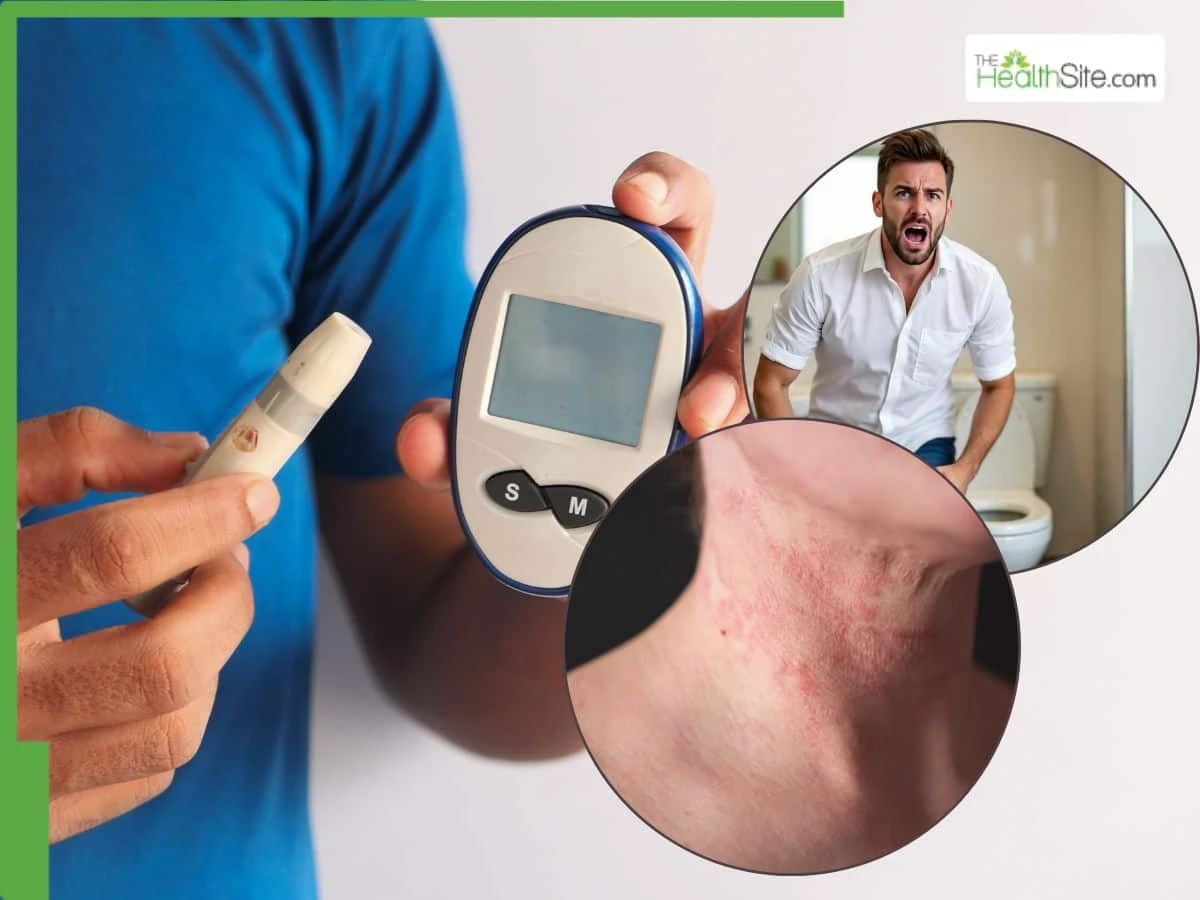Diabetes Symptoms: High blood sugar can go unnoticed, but watch for these 5 diabetes symptoms: frequent urination, extreme thirst, fatigue, blurred vision, and slow healing wounds.
Diabetes is broadly classified into two types: Type 1 and Type 2. While they differ in their causes, both conditions result in excessive glucose levels in the blood. Every year, millions of individuals are diagnosed with diabetes, and many cases often remain undetected.
The symptoms of diabetes can vary from person to person. In some cases, the signs may not appear early, making it difficult to recognize. However, if you start experiencing any of the symptoms listed below, it is important not to delay and to consult a healthcare professional immediately.
5 Unusual Diabetes Symptoms Other Than Frequent Urination
So, here are five unusual diabetes symptoms that you really need to know.
Darker Skin On The Neck
Yes, many people are not aware of it, but it is one of the signs of diabetes, and you might be able to spot dark patches on your skin easily, and it is mostly prominent around your neck. You can also experience a thicker scanner around your neck. If you are suffering from diabetes, a popular name for this condition is AN, Acanthosis Nigricans, and you might be able to notice it in the groin or armpit area, too.
But it is most common in people with type 2 diabetes and those who have darker complexions. In this condition, high levels of insulin in the bloodstream multiply faster.
Repeated Infections
If you have diabetes, it is likely to awaken your immune system, and you can fall ill. Often, some infections that are linked to diabetes are Vaginal infections, yeast infections, bladder infections, and skin infections. Infections, White blood cells are the ones that suffer a lot, as it is difficult for them to fight off infections and travel through the blood.
Changes In Vision
Sometimes you might think that vision changes are a sign of weak eyes, but what is lesser known is that it might be a sign of diabetes. High insulin levels can affect your body and even your eyes. It can also elevate word levels in your eyes, and as a result, you will have swelling in the vision and difficulty focusing on objects.
Itching
One of the symptoms of diabetes includes blood vessels that are caused by an increase in blood sugar levels, and that also means a lack of circulation in your limbs, which can cause itching all the time because your skin dries out, and it starts peeling. In addition to this, it also damages nerve fibres throughout your body, and it can happen at any age, but most probably it targets nerves in the hand and feet.
Weight Loss
Weight loss is very common in diabetes because your body is not able to produce insulin properly, and cells lack glucose to use it for energy, which is why your body starts burning fat and muscle mass, and you might start to notice that you are losing weight, even without exercising.
Frequent Urination At Night
This condition in diabetes is called polyuria, and it is one of the very common symptoms that is responsible for frequent urination and urge to urinate, and this also causes excess glucose and water to be excreted in the urine.
Diabetes: How To Control Blood Sugar Levels Naturally?
Some of the preventive measures of diabetes include managing weight. If you try to lose a small amount of weight, even in your abdominal area, you might see a reduction in the risk of type 2 diabetes. Sweet least workout for 30 minutes every day and try practising my fullness to manage stress.
Always try to prioritise healthy eating, including a lot of fruits, vegetables and whole grains in your diet. Try avoiding sugar, such as sugary drinks and processed foods. You can opt for unsaturated fats instead of saturated fats.
If you have the habit of smoking, then quit it because this is one of the risks that causes diabetes and even other health issues.
What Happens When Your Blood Sugar Level Is Too High?
It can cause kidney disease, nerve damage, eye damage, and even foot problems.
How Can I Monitor Diabetes?
You can monitor diabetes through regular blood sugar checks with a glucometer, or by using a Continuous Glucose Monitor (CGM) for real-time updates. Periodic HbA1c tests help track long-term control. Keeping a log of readings, diet, exercise, and lifestyle factors is crucial. Regular health checkups to monitor blood pressure, kidneys, and eyes are equally important. Always pay attention to body signals and consult your doctor for timely adjustments.
About the Author
 Satata Karmakar
Satata Karmakar
A postgraduate in Journalism and Mass Communication, Satata Karmakar brings over a decade of experience working with leading media brands, including Outlook Magazine, Microsoft News, and The Statesman. As an Assistant News Editor at TheHealthSite.com, she specialises in …
